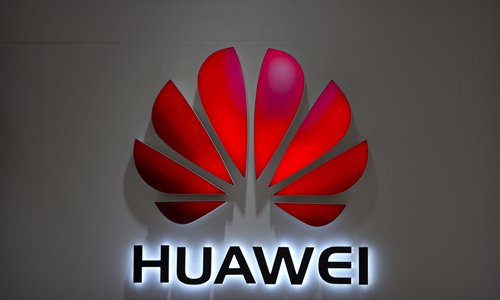HOME >> BUSINESS
Huawei requests removal from US Entity List
By Chu Daye Source:Global Times Published: 2019/11/18 20:53:40
Company says the ban has done significant economic harm to its US partners, suppliers

Huawei logo. Photo: IC
Chinese telecoms giant Huawei has said a third 3-month reprieve by the US on Monday won't have substantial impact on its business. The Chinese technology company called for its removal from the US' Entity List to end to its "unjust treatment."
In a statement posted on its website on Monday, the US Department of Commerce announced that it will extend a Temporary General License, which authorizes exports to Huawei, for 90 days.
In a statement sent to the Global Times, Huawei said the extension of the license won't have a substantial impact on its business and the US' latest decision does not change the fact that Huawei continues to be treated unfairly.
The company pointed out that its inclusion on the Entity List has caused more harm to the US than to Huawei, as significant economic harm has been done to the US companies with which it does business.
Huawei, the world's largest telecoms equipment maker, buys parts and software from a large number of US-based suppliers including Flex, Broadcom, Qualcomm and Microsoft.
Huawei's attitude toward Washington's ban on obtaining its US supplies has progressed from defiant to calm, analysts said on Monday.
Huawei founder Ren Zhengfei has reportedly expressed an unconcerned attitude toward the development of the US ban. He offered an overture to European companies by saying that they should invest further in their chip plants, and that Huawei will increase its quantity of purchases, according to financial news portal yicai.com on Sunday.
Yi Beichen, a mobile internet observer, said on Monday that Huawei now looks at this matter with an air of calm.
"The US flip-flops like a giant baby and can no longer stir up emotions in Huawei's employees, whether that would be surprise or misgivings," Yi told the Global Times, noting that the company is well prepared to battle adversity.
The US, citing national security concerns, placed Huawei on a blacklist in May but allowed reprieves in May and again in August.
"Huawei has fully set its mind on improvements to cope with external challenges," Yi said.
This observation appears to ring true in the social media buzz surrounding Huawei in China. People's attention seems to be more focused on how to acquire the highly coveted Huawei Mate X 5G foldable smartphone, whose resale value is speculated to be as high as 100,000 yuan ($14,230).
As the US' strangling tactics continue, Yi predicts some real losses will be faced by US companies. "War breeds new technologies. A tech war does the same."
For one thing, Google's Android operating system (OS) may have to yield its dominance in terms of mobile phone operating systems as it's poised to lose its penetration of Huawei-branded terminals, which in 2019 alone will total an estimated 270 million units, Yi said.
Huawei is devising its own replacement, Harmony OS, which is widely regarded as Huawei's plan B to replace Google's Android OS amid its US-led crackdown. Alternatives offered by Microsoft may have a chance for a comeback, analysts said.
Huawei shipped more than 185 million smartphones in the first three quarters of 2019, up 26 percent year-on-year despite the US ban, the company said in October.
Fu Liang, a Beijing-based telecoms industry expert, told the Global Times on Monday that if there is an extended grace period, it would be good for both Huawei and its US suppliers.
"The US government can impose a ban on one day and lift it on another. But this causes serious disruptions for the supply chain, which typically needs months of preparation and adjustments for a product," Fu said.
The uncertainty hanging over the supply chain won't be tolerated by Huawei, and the company must have launched programs to look for alterative partners and solutions, in particular from Europe, Japan and the island of Taiwan, Fu said.
"Without orders from Huawei, the company's current suppliers will find their competitors growing stronger day by day," Fu said.
The development comes at a sensitive time, as the market is expecting an initial agreement between China and the US to resolve the 17-month-long trade war.
The US Department of Commerce has reportedly received more than 200 requests from US companies for individual licenses to continue selling components to Huawei.
Posted in: COMPANIES